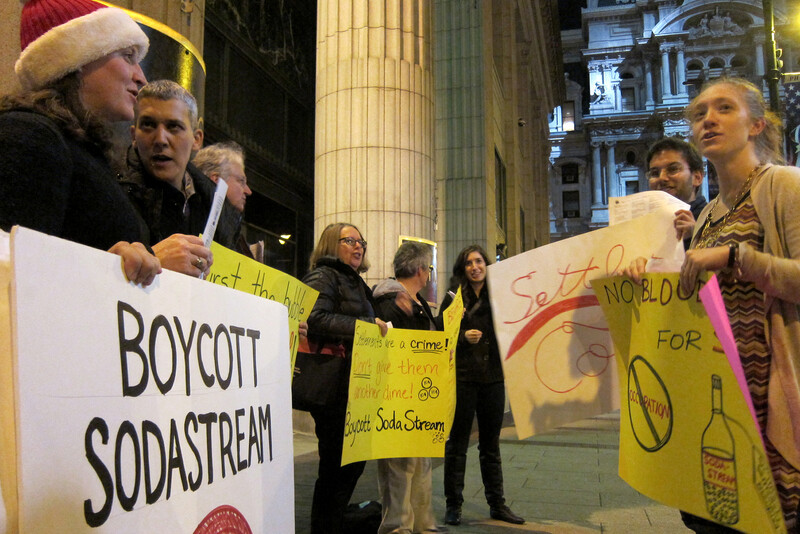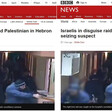Activism and BDS Beat 6 March 2013

Sodastream has found itself the target of boycott calls around the globe. (AFSC Photos/Flickr)
The Israeli manufacturer SodaStream has resorted to manipulation and misinformation in an attempt to ensure its drinks-making products remain on sale in British stores.
In a letter sent to the head office of Leekes, a homeware store with outlets in England and Wales, SodaStream wrote: “One of our many manufacturing and assembly sites is located in a city called Mishor Adumim, which is in ‘Area C’ of the currently disputed territory in Israel.”
Mishor Adumim, however, is not in Israel. It is a huge settlement built on the confiscated land of seven Palestinian towns in the West Bank; a land theft which, according to Who Profits — the organization monitoring occupation-complicit firms — is “considered the largest single expropriation in the history of the Israeli occupation.”
The letter was sent to Leekes in response to a complaint by a member of Palestine Solidarity Campaign (PSC) which had been dismayed to see SodaStream’s products on sale in a branch in the West of England. The PSC member wrote to Leekes to point out that the products had been manufactured in a settlement built on illegally occupied Palestinian land and to ask that they be withdrawn from sale.
His letter was forwarded to SodaStream by Leekes. SodaStream responded at the end of January with its false claim that Mishor Adumim and Area C are in Israel.
International Law
In fact, Area C is part of the occupied Palestinian West Bank and all Israeli settlements built on the land are constructed in defiance of international law. UN Resolution 446 clearly states: “The policy and practices of Israel in establishing settlements in the Palestinian and other Arab territories occupied since 1967 have no legal validity, and constitute a serious obstruction to achieving a comprehensive, just and lasting peace in the Middle East.”
This position is uncompromisingly backed by the European Union, which has stated that settlements are “illegal under international law, constitute an obstacle to peace and threaten to make a two-state solution impossible.”
Moreover, the arrival of citizens from outside the West Bank to live in the settlements — including Mishor Adumim — is a violation of Article 49 of the Fourth Geneva Convention. This transfer of a civilian population into occupied territory, breaching the Convention, constitutes a war crime under the Rome Statute of the International Criminal Court.
SodaStream’s letter to Leekes’ head office mentions none of this. Instead, it adds: “Our facility here and the land on which it is built is not illegal and importing from Mishor is not contrary to any EU, UN or other laws and all our customs and duties are rightfully paid.”
Leaving aside its complicity in Israel’s illegal occupation of Palestinian land and potential war crimes, SodaStream, contrary to its denial to Leekes, is also in contempt of EU trade agreements. Its fizzy drink-making machines, which are manufactured on stolen Palestinian land in the West Bank, are falsely exported under the label “Made in Israel.”
This unfairly exempts them from customs fees when exporting into the EU — the 2000 EU-Israel Trade Agreement exempts goods imported from Israel from customs fees but does not exempt West Bank settlement goods. This deliberate mislabelling by SodaStream has been highlighted by Who Profits as a possible case of consumer fraud.
Misleading
SodaStream goes on to inform Leekes that its employees in Mishor Adumim are “over 80 percent Palestinian, including the factory manager himself.” The letter ends by saying: “We are proud of all our employees, our site in Mishor and the opportunities it provides for our employees and their families.”
The text of SodaStream’s letter was incorporated into a letter sent to the PSC member by Leekes’ Buying Controller, who wrote: “I hope that this response allays any concerns you may have had about the production of this range. Thank you for this letter and for enabling us to clarify the position with the supplier.”
Unfortunately, far from clarifying anything, SodaStream has deliberately misled Leekes in a successful ploy to keep its product on its shelves.
This supply of misinformation to the public is not unique in SodaStream’s ongoing campaign to relaunch itself, following a steep decline in sales over the last two decades.
At the end of December, the company released a video titled “SodaStream – Building Bridges, Not Walls.” The eight-minute film starts with shots of Palestinian workers being picked up from their towns and villages in the West Bank by a SodaStream bus and driven to the factory in Mishor Adumim — where, as in all settlements, no Palestinians are allowed to live.
This simple fact, which starkly highlights the apartheid of the Israeli occupation, is not mentioned in the film. Instead, SodaStream’s CEO, Daniel Birnbaum, describes how the company has made it “seamless for the Palestinians to leave their homes in the West Bank, their village and come here across the wall where they are well received and well respected and well paid.”
A different reality
In the mind of the uninitiated viewer, the fortunate Palestinians are being taken away from the troubles of the West Bank and to a haven on the other side of the wall. They are not told by Birnbaum that most of the land “across the wall” is also the Palestinian West Bank, which has been stolen by the route of the wall. Nor are they told that the whole of the West Bank is illegally occupied by Israel, which has destroyed the Palestinian economy so that any jobs, let alone “well-paid” jobs, are scarce — and there is no respect by Israeli settlers and soldiers for the Palestinians who live there.
Instead, Birnbaum tells his viewers that the SodaStream factory in Mishor Adumim is a “fantastic sanctuary of co-existence and an example of peace in a region that is so troubled and so needs hope.” His words are staggeringly disingenuous. Numerous reports by organizations such as Kav LaOved, the Israeli workers’ rights organization, and Who Profits, detail how Palestinian workers in Israeli settlement farms and factories are underpaid, denied basic rights such as holiday or sick pay, denied the right to organize into unions, are left to fend for themselves if injured at work, and have to obtain permits from the Israeli security services to work in the settlements — permits which are under constant threat of withdrawal if they complain about their conditions or fail to turn up for work for any reason.
But the restrictions on human movement and trade placed on the West Bank by its Israeli occupiers has resulted in the destruction of the Palestinian economy and Palestinians are forced to look for work in the settlements which are eating away their land, providing cheap labor to companies which enjoy tax breaks from the Israeli government for locating in those very settlements and which help to cement its occupation.
A 2011 survey, cited by Who Profits, revealed that 82 percent of Palestinians would leave their job in the settlements if a suitable alternative were available.
And despite Birnbaum’s fine words about respect and good pay, Kav LaOved has had to assist workers at the SodaStream factory in their struggle to obtain improved working conditions, better salaries and, at times, unpaid wages. They remain, however, Kav LaOved notes, “at the bottom of the hierarchy in the factory and constantly fear their dismissal.”
The reality for Palestinians working in SodaStream’s settlement factory is, it turns out, a world away from the “sanctuary” described by Birnbaum. Given this, and the misinformation provided by SodaStream to Leekes, Birnbaum’s final words in the video are not only ironic, but almost laughable.
Turning his attention to the growing international boycott campaign against SodaStream, Birnbaum complains: “There are so many untrue, misinformed, manipulative claims against SodaStream, as if we’re benefitting from being in this location, and they’re so untrue.”
And, no doubt fully aware how much his company benefits from its settlement location — exploiting Palestinian labor and enjoying the perks of low taxation — while showing complete disregard for human rights and international law, Birnbaum keeps a straight face to the misleading end.






Comments
Soda Stream lies
Permalink The Renegate replied on
Years ago the german Soda Stream company deverted from my question about the illegal origins of their products, writing that ´"our companie's head office is situated within the close aerea of Ben Gurion International Airport...", denied even the existance of their factury in Maale, occupied Palestine. Well, what else do you expect from a lettlement-profitting company other than lies? They lie just as lied to the international community the founding father of Israel, Ben Gurion .
Soda Stream Lies
Permalink Bill Crompton replied on
Even more interesting. On a recent visit to Liverpool I was shopping in a "Home Bargain" store which carried a stock of Soda Stream apparatuses. I examined the box and was surprised to discover the the apparatus was apparently made in China! I couldn't find any reference to any location in the Middle East.
Next time I'm there I'll take a photo. (and I'll put a "made in illegal settlements" sticker on them :) )